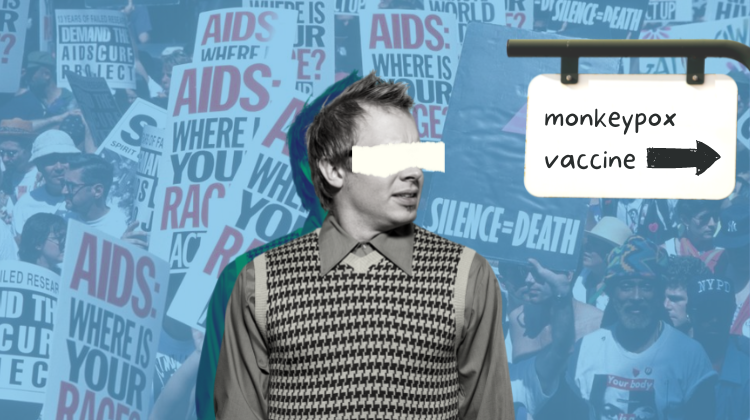Here’s How You Can Avoid Misinformation and Protect Yourself
What is Monkeypox?
Monkeypox (MPX) is a disease transmitted by close skin to skin contact or transmission of bodily fluids that results in skin lesions and uncomfortable bumps on people’s skin. It also can cause flu-like symptoms such as fever, nausea, and more.
The first known case of MPX was detected during the 1970s in Africa. However, the U.S. has never experienced a MPX outbreak as severe as what we are experiencing now.
The monkeypox outbreak in the meantime has grown exponentially, with case counts doubling each week. Unfortunately, misinformation is already spreading rapidly, including the idea that only men who sleep with men (MSM) can contract monkeypox.
Gigi Singer, who holds a Master in Public Health from Columbia University and is a sex educator, said one important thing to know is that, “Monkeypox is not an STI. Close, intimate contact can transmit it, but it’s not an STI.
Some people are saying it’s the new HIV–which is super problematic in itself–but it’s not the same thing. You can’t control people’s rhetoric, but you can at least try to combat it.”
Monkeypox Messaging and HIV Messaging DeJa Vu
Many political activists, HIV prevention experts, epidemiologists, and queer activists have pointed out the frustrating similarities between the messaging and response surrounding HIV with that of MPX.
HIV Response
- The mainstream press ignored the virus for years except when the first cases appeared in women, children or heterosexual men
- What was considered gay sex was demonized by the media and many people engaged in slut shaming as a way to blame those who contracted HIV
- Panic ensued after HIV was reported as a “gay disease”
- There was lack of resources from a public health perspective, and research for treatment was not prioritized
Monkeypox Similarities
- Monkeypox was taken more seriously and media coverage increased when two children contracted MPX
- Reports of targeting Gay sex, slut shaming, and reports of “promiscuity”
- There is a sense of panic around MPX as reporting has spun this as a “gay disease”
- There is a lack of resources, treatment options, and lack of vaccines available
According to Politico, Harold Phillips, director of the Office of National AIDS Policy in the White House has acknowledged the similarities between the AIDS crisis and the current MPX outbreak.
“There are some similarities between the community that is being impacted by this disease. The pain, suffering, the fear of stigma, but this was not a laughing matter this time in the White House,” Phillips said, noting that during the AIDS crisis, White House staff were known to laugh and joke about the crisis during press conferences.
We asked Erice Taylor, RN and provider at the Center for Health Empowerment in Austin, Texas his thoughts on this news.
“I don’t like the way this is being presented in the media. Monkeypox is a virus that is not relegated to a particular community. Transmission is not just from sexual activity. You could be in an environment where somebody has it and you could possibly get it, especially if your immune system is a little off and you get exposed.”
It’s not just MSM who are experiencing stigma, though, according to Taylor. “One thing I’ve noticed in some of the messaging I’ve seen is that they show a lot of people of color. It’s not just for people of color. I have a problem with that.”
How to Help
First and foremost, try to stay up-to-date on MPX recommendations from public health professionals.
“Tackling misinformation in ways that you can. If you see a Facebook post that provides misinformation, message that person and ask them to consider taking it down. Correct people when they say things that are stigmatizing or that slut shame. Take the blame off of the person who is living with monkeypox. Ask them how they are feeling, replace that first instinct of fear and blame with compassion,” Singer suggests.
You can find sex educators like @getqcareplus, @pryority_malellc, and @thegigi.spot on social media for reliable, up-to-date information about MPX.
Try to follow your local health department to learn when resources come available to you.
Thankfully, there is a vaccine that is 85% reliable at preventing MPX. Vaccine roll out is slow in many states. But consider getting the vaccine when it is available to you.
Bio
Eric Taylor holds a Master of Science in Nursing from the University of South Alabama.
He has served in various clinical and administrative roles with the Department of Veteran Affairs, including Critical Care Registered Nurse, Primary Care Nurse Practitioner, GI/Hepatology Nurse Practitioner, Chair of the Advanced Practice Registered Nurse Council, and currently the Lead Home Telehealth Nurse Practitioner.
He also currently serves as NP Faculty in the Primary Care Center of Excellence at the Michael E. DeBakey VA Medical Center, is an instructor of Nursing at the University of Texas, and works at The Center for Health Empowerment as an RN specializing in PrEP.
Gigi Singer, MPH (she/her) is a NYC-based sexuality educator who holds a Master’s Degree in Public Health from Columbia University with a certificate in Sexuality, Sexual & Reproductive Health and she is a trained sexuality educator; her Bachelor’s degree was in Gender, Sexuality, and Women’s Studies. She is the owner of The Gigi Spot LLC, through which she does consulting and freelance work in the digital sex education sphere (i.e. content creation, blog management, and blog writing) and she also works at the Museum of Sex in Manhattan. She loves talking about pleasure, sexual empowerment, sexual communication, and sex toys!
